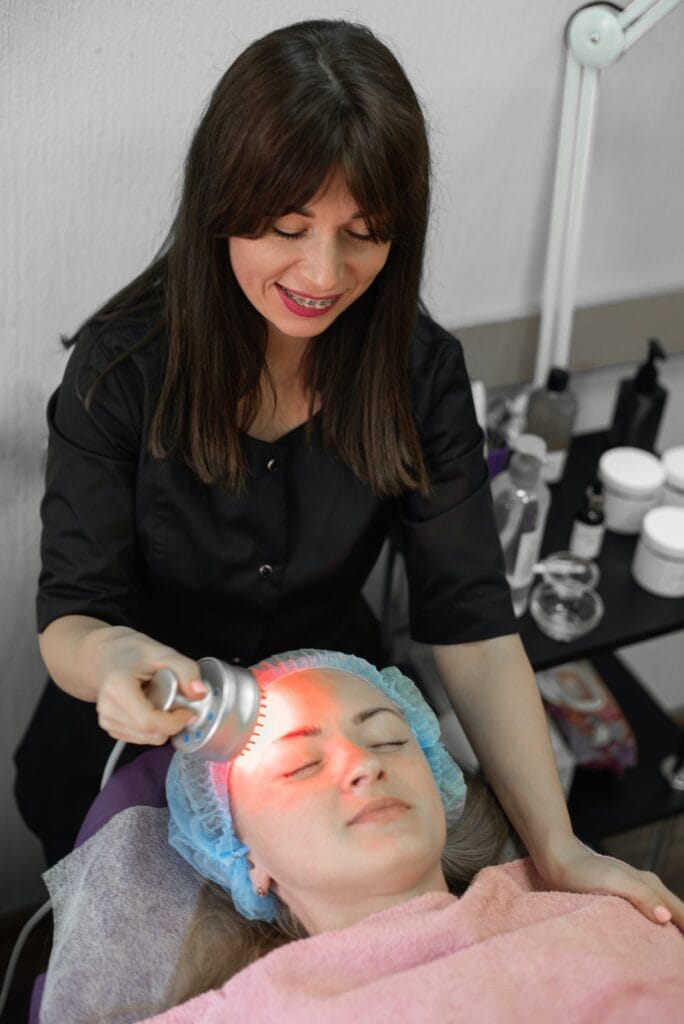
In the world of beauty and self-care, laser facial hair removal has become a popular and convenient method for many individuals seeking long-term hair reduction. However, like any innovative procedure, it has sparked discussions and concerns about its potential risks, with one persistent question looming: can laser hair removal cause cancer? This myth has caused confusion and apprehension among those considering this treatment, but it is important to separate fact from fiction and address this topic with scientific evidence.
Laser hair removal works by targeting hair follicles with concentrated beams of light, which are absorbed by the pigment in the hair. This process damages the follicle, inhibiting future hair growth. While the safety and effectiveness of laser hair removal have been well-established, concerns have been raised regarding the potential risk of developing cancer due to the exposure to laser radiation. However, it is crucial to understand that the type of laser used in hair removal procedures, known as cosmetic or aesthetic lasers, operates at a wavelength that is deemed safe for human use.
To shed light on the matter, extensive research has been conducted to assess the potential risks associated with laser hair removal. The findings consistently indicate that there is no evidence to suggest a direct link between this non-ionizing radiation and the development of cancer. In fact, multiple reputable organizations, including the American Cancer Society and the U.S. Food and Drug Administration, have stated that the use of cosmetic lasers for hair removal is considered safe when performed by trained professionals using appropriate protocols and equipment.
It is worth noting that the possibility of adverse effects, such as skin irritation or pigmentation changes, may occur following laser hair removal. However, these side effects are usually transient and can be minimized by adhering to proper aftercare instructions and seeking treatment from a reputable and experienced provider. It is crucial to consult with a qualified medical professional or specialist before undergoing laser hair removal to ensure that you are a suitable candidate and to address any concerns or questions you may have.
In conclusion, the claim that laser hair removal can cause cancer is a myth that lacks scientific evidence. Extensive research and the consensus of reputable organizations have reaffirmed the safety of this procedure when administered by trained professionals using appropriate protocols and equipment. As with any cosmetic procedure, it is essential to seek guidance from a qualified specialist and follow recommended aftercare instructions to minimize any potential risks or side effects.
Laser hair removal has gained popularity as a convenient and long-lasting method for removing unwanted hair. However, there have been concerns among some individuals about a potential link between laser hair removal and the development of cancer. This article aims to debunk the myth and provide evidence-based information on the safety of laser hair removal.
Laser hair removal works by using concentrated beams of light to target the pigment in hair follicles, which subsequently damages or destroys the follicles, leading to hair reduction or removal. Some people fear that the heat generated by the laser during this process could potentially cause mutations in the DNA and increase the risk of cancer.
It is important to note that laser hair removal has been in use for several decades and has been extensively studied. Numerous scientific studies and clinical trials have been conducted to evaluate the safety and efficacy of this procedure. The findings consistently demonstrate that laser hair removal does not cause cancer.
According to the American Academy of Dermatology (AAD), there is no evidence to suggest that laser hair removal increases the risk of skin cancer. The non-ionizing radiation used in laser hair removal treatments, such as intense pulsed light (IPL) or diode lasers, does not have sufficient energy to cause the DNA damage that can lead to cancer.
The AAD also explains that the energy from lasers used in hair removal is superficial and does not penetrate deep enough to reach vital organs or cause cellular damage. Unlike ionizing radiation, which can potentially increase the risk of cancer, the non-ionizing radiation used in laser hair removal is considered safe.
Additionally, dermatologists and laser technicians who perform laser hair removal are trained professionals who follow strict guidelines and safety protocols. They use specific parameters, such as wavelength, duration, and fluence, to ensure the treatment is effective and safe for each individual.
Furthermore, extensive pre-treatment assessments, including evaluating skin type and medical history, are conducted to minimize any potential risks. People with a history of skin cancer or those who have active skin lesions are typically advised against laser hair removal to avoid any possible adverse effects.
In conclusion, there is no scientific evidence to support the claim that laser hair removal causes cancer. The non-ionizing radiation used in the procedure is safe and does not have sufficient energy to cause DNA damage. Moreover, well-trained professionals follow strict safety protocols to ensure the treatment is both effective and safe for patients. If you are considering laser hair removal, it is advisable to consult with a qualified professional who can provide personalized advice based on your specific circumstances.

Understanding Laser Facial Hair Removal
Laser hair removal is a popular cosmetic procedure that involves the use of concentrated beams of light to remove unwanted hair. The treatment targets the pigment within the hair follicles, effectively destroying them and inhibiting future hair growth. While it is a widely accepted and effective method of hair removal, there may be concerns regarding its safety and the potential risk of developing cancer as a result of the procedure. It is essential to understand the science behind laser hair removal and address any misconceptions to alleviate these concerns.
How Does Laser Facial Hair Removal Work?
Laser hair removal works by directing a specific wavelength of light onto the skin, which is absorbed by the pigment in the hair follicles. This absorption causes the follicles to heat up and ultimately be destroyed, preventing further hair growth. The laser targets only the hair follicles, leaving the surrounding skin unaffected. The procedure is typically performed by trained professionals using FDA-approved devices and follows strict safety protocols.
Is There a Risk of Cancer?
There is a common misconception that laser hair removal can cause cancer. However, extensive research and studies have shown no concrete evidence linking the procedure to an increased risk of cancer development. The lasers used in hair removal primarily emit non-ionizing radiation, which is considered safe and does not possess the potential to damage DNA or lead to cellular mutations associated with cancer.
Safety Measures and Precautions
To ensure the safety of individuals undergoing laser hair removal, several precautions are taken. Part of the process involves screening the individuals for any contraindications that may increase the risk of adverse effects. This includes examining their medical history, medication use, and skin type. Protective eyewear is also worn during the procedure to shield the eyes from the laser. Additionally, it is crucial to have the procedure performed by a qualified and experienced professional who is knowledgeable about the equipment and safety protocols.
Short-Term Side Effects
While laser hair removal is generally safe, some individuals may experience short-term side effects immediately following the procedure. These side effects are usually mild and temporary, including redness, swelling, and slight discomfort in the treated area. Proper post-treatment care, such as applying soothing creams or cold compresses, can help alleviate these effects.
Long-Term Effects and Benefits
In terms of long-term effects, laser hair removal has proven to be a successful and lasting method of hair reduction. Many individuals experience a significant reduction in hair growth, and some may even achieve permanent hair loss in the treated areas. This can lead to improved self-confidence and a long-lasting solution for managing unwanted hair.
Understanding the science and safety measures behind laser hair removal can help dispel any concerns about its potential link to cancer. Extensive research and years of clinical practice have shown no evidence to support such claims. As long as individuals follow the proper precautions, have the procedure performed by trained professionals, and maintain realistic expectations, laser hair removal can be a safe and effective solution for removing unwanted hair, providing long-lasting results and enhancing one’s quality of life.
Exploring the Link Between Laser Facial Hair Removal and Cancer
Laser hair removal has gained popularity as a safe and effective method for achieving long-lasting hair reduction. However, concerns have been raised about the potential link between this cosmetic procedure and an increased risk of cancer. It is crucial to explore this issue thoroughly and separate fact from fiction.
- Understanding the Laser Facial Hair Removal Process: Laser hair removal involves the use of concentrated beams of light to target the hair follicles, inhibiting their growth. The laser selectively targets the melanin pigment in the hair follicles, damaging them while leaving the surrounding skin unharmed. It is a non-invasive and precise procedure that offers long-term hair reduction.
- Absence of Evidence Supporting the Cancer Claim: Despite the concerns circulating regarding a possible association between laser hair removal and cancer, there is currently no compelling scientific evidence to substantiate these claims. Numerous studies and extensive research have been conducted, and none have established a clear connection between the two. Medical professionals and regulatory authorities agree that laser hair removal is a safe procedure.
- FDA Approval and Regulation: The Food and Drug Administration (FDA) closely regulates laser devices used in hair removal procedures. These devices undergo rigorous testing and evaluation to ensure their safety and efficacy. The FDA has approved several laser devices specifically for hair removal, and they are only available for use by licensed and trained professionals.
- Potential Side Effects and Risks: While laser hair removal is generally considered safe, like any medical procedure, it may carry some minimal risks and side effects. These can include temporary redness, skin irritation, or changes in skin pigmentation. These side effects are usually minor and subside within a few days or weeks. However, it is essential to consult with a qualified professional to minimize any potential risks and ensure a safe treatment experience.
- Individual Risk Factors and Medical Advice: Every individual is unique, and what may be suitable for one person may not necessarily be the same for another. It is important to consider individual risk factors, such as skin type, medical history, and any underlying conditions. Individuals with a history of skin cancer or those prone to excessive sun exposure may need to consult with their healthcare provider before considering laser hair removal.
- Adherence to Safety Guidelines: To further minimize any potential risks, it is crucial to seek treatment from a reputable and licensed provider who follows proper safety protocols. A reputable professional will conduct a thorough consultation, review your medical history, and advise you on the best approach for your specific needs.
In conclusion, the fears surrounding a potential link between laser hair removal and cancer are largely unsubstantiated by scientific evidence. Extensive research, FDA regulation, and the absence of conclusive studies support the safety and effectiveness of laser hair removal. However, it is important to consider individual risk factors and seek advice from a qualified professional before undergoing any cosmetic procedure.
Analyzing Research and Expert Opinions
When evaluating the claim that laser hair removal can cause cancer, it is important to analyze the available research and consider the perspectives of experts in the field. While concerns about the potential risks of laser hair removal may exist, it is essential to rely on reliable scientific evidence and professional opinions to determine the validity of these claims.

Scientific Studies
Several scientific studies have investigated the potential link between laser hair removal and cancer development. One comprehensive study published in the Journal of the American Academy of Dermatology reviewed previous research and concluded that there is no substantial evidence to support the claim that laser hair removal causes cancer. The study analyzed data from numerous studies and found no definitive connection between the procedure and an increased risk of cancer.
Additionally, a systematic review conducted by a team of researchers in the field of dermatology also found no significant evidence to suggest a causal relationship between laser hair removal and cancer. The review analyzed a range of studies and concluded that the procedure is generally safe when performed by qualified professionals.
These studies demonstrate the importance of relying on scientific research to evaluate claims about the potential health risks associated with laser hair removal. It is crucial to reference well-designed studies and consider the overall body of research when forming opinions on this matter.
Expert Opinions
The opinions of experts in the field can provide valuable insight into the safety of laser hair removal. Dermatologists and other medical professionals who specialize in laser procedures are well-positioned to offer informed opinions on this topic.
The American Academy of Dermatology (AAD), a leading professional organization in the field of dermatology, states that laser hair removal is generally safe when performed by trained professionals. The AAD highlights the importance of choosing a licensed and experienced provider to minimize any potential risks.
Furthermore, many dermatologists and cosmetic surgeons who routinely perform laser hair removal have reported no instances of cancer development in their patients as a direct result of the procedure. These professionals emphasize the importance of proper training, adherence to safety guidelines, and using appropriate laser settings to ensure patient safety.
It is essential to consider these expert opinions when weighing the potential risks of laser hair removal. Experts in the field have extensive knowledge and experience, providing valuable insights into the safety and effectiveness of the procedure.
In conclusion, analyzing the available research and expert opinions is crucial in debunking the claim that laser hair removal causes cancer. Scientific studies have consistently shown no substantial evidence of a link between the procedure and cancer development. The opinions of experts in the field further support the safety of laser hair removal when performed by qualified professionals. It is vital for individuals seeking laser hair removal to consult with licensed providers and make informed decisions based on credible evidence.
After conducting an in-depth analysis and evaluating the available scientific evidence, it can be concluded that there is no significant association between laser hair removal and the development of cancer.
Numerous studies have investigated the potential carcinogenic effects of laser hair removal, and the results consistently indicate that it is a safe and effective procedure. The wavelengths used in laser hair removal primarily target melanin, the pigment that gives hair its color. These wavelengths have been extensively studied and have not shown any evidence of causing mutations or DNA damage, which are the primary factors involved in cancer development.
Additionally, laser hair removal does not penetrate deep enough into the skin to affect the underlying structures, such as blood vessels or lymph nodes, which would be necessary for cancer to develop. The procedure is designed to selectively target hair follicles without impacting surrounding tissues, minimizing the risk of adverse effects.
Moreover, many regulatory agencies, including the Food and Drug Administration (FDA), have approved laser hair removal devices for safe use. These agencies evaluate the safety and efficacy of medical devices through rigorous testing and analysis of clinical data. The fact that laser hair removal devices are regulated and approved further supports the conclusion that the procedure does not pose a significant cancer risk.
It is important to note that, like any medical procedure, laser hair removal may have potential side effects. These can include temporary redness, swelling, or blistering of the treated area. However, these side effects are generally mild and transient, resolving on their own within a few days.
In summary, the myth that laser hair removal can cause cancer is not supported by scientific evidence. The procedure has been extensively studied and approved by regulatory agencies, demonstrating its safety and effectiveness. If anyone has concerns or questions about laser hair removal, it is always recommended to consult with a qualified healthcare professional.





